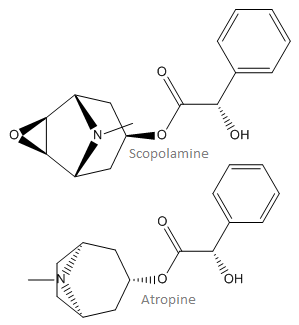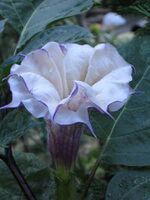Datura
| Datura | |
|---|---|
 The skeletal formula of scopolomine and atropine. | |
| Dosage | |
| Differs wildly between plants. | |
| Duration | |
| Total Duration | 3 days |
| Onset | 60 - 120 minutes |
Datura is a genus of legal flowering plants that contains two psychoactive chemicals in roughly equal amounts.
These are known as Scopolamine and Atropine, two molecules that are both in the tropane alkaloid class, with anticholinergic effects. The plants precise and natural distribution seems to be throughout most of the temperate and tropical regions of the globe, owing to its extensive cultivation and naturalization. There are a total of nine different species in the Datura genus, but the two most well-known species are Datura inoxia and Datura strammonium. Both of which have been used in a shamanic context for religious purposes on most continents since before recorded history began, with records of its use being found throughout the ancient americas, europe and india.
As a general rule, EP neither recommends nor discourages the use of any psychoactive, however, in the case of tropane alkaloid-containing Solanaceae plants, we think it is important to note that an overwhelming majority of those who describe to us their use of Datura (and to a lesser extent, Belladonna, Brugmansia and Brunfelsia) find their experiences extremely mentally and physically unpleasant and not infrequently physically dangerous.
Chemistry
Scopolamine and atropine, the active chemicals in datura, are both tropane alkaloids.
Pharmacology
Datura is an antimuscarinic agent.
Subjective effects
Physical effects
The physical transition from reality to delirium is an extremely uncomfortable one, with the first noticeable sensation being that of having an extremely light and floaty body. Although Datura is not nearly as dysphoric as DPH it is still capable of feeling overwhelmingly unpleasant, this is usually in the form of nausea, dizziness, hot / cold flushes, extreme dehydration and a frequent need to urinate which tends to painfully conflict with a feeling of concrete blocking your urethra.
Cognitive effects
The head space of datura is described by many as generally negative and dysphoric throughout the trip, generally consisting of extreme paranoia and feelings of impending doom. It is largely confusing and disorienting often leading to a complete inability to communicate or understand normal language. It contains unique cognitive effects found almost exclusively in the deliriant class.
The most prominent of these effects include,
- Dysphoria
- Deceleration of thought
- Suppression of emotion
- Suppression of information processing
- Suppression of memory formation (amnesia)
- Time dilation
Visual Effects
The hallucinations themselves however eventually become elaborate enough to cause the tripper to completely forget how terrible they are feeling. They are often extremely interesting. Manifesting themselves as completely concrete forms that are indistinguishable from reality in the trippers delirious state. Varying from mundane, to fascinating and to horrifying nightmarish experiences.
Visual Suppression
DPH does not enhance visual stimuli in the way that psychedelics do, instead they tend to degrade and decrease visual apptitude both increasing hallucination and degrading vision.
- Decreased visual acuity
- Suppression of pattern recognition
- Blurred vision
Blurriness is a lasting effect that in serious cases can take days or weeks to eventually fade.
Distortions
As for visual distortions and alterations, effects experienced are detailed below:
- Visual drifting (melting, breathing, warping and flowing) - In comparison to other hallucinogens this effect can be described as intricate in complexity, jittery, slow and rigid in motion,static in their permanence, realistic in believability, and interactive in plasticity
- After images
Hallucinations
Datura and other deliriants such as DPH are unique in that they offer solid hallucinations which display themselves seamlessly into waking consciousness, similar to fully formed dreams or delusions. In contrast, classical psychedelics and dissociatives have progressive levels of multiple all encompassing sensory effects, before reaching the level of concrete hallucination.
Visual geometry is not a commonly reported effect of datura, instead it is characterized by solid hallucinations which seem indifferentiable from normal reality. These can literally encompass anything but common manifestations include,
- Black phosphenes, like the ones when you "see stars"
- Spiders and various insects
- Shadow people
- "Hatman"
- Animals and pets
- Human beings, usually behaving completely normally
- Phantom cigarettes, spliffs and bowls
- Phantom water and drinks
- Floating inanimate objects that appear out of nowhere, only to disappear after your hand goes directly through the object while trying to grab hold of it.
- Every day conversations with friends, family members and fictional people that aren't really there.
The hallucinatory states in datura and other deliriants are more delirious and uncontrollable than that of any other commonly used hallucinogen. These states alternate between waking external hallucination and internal hallucinatory states.
The effects of such hallucinatory states include,
- Transformations - Transformations of objects within the external environment often morph into other objects, animals and people and seem to follow a persons current mind state
- Imagery - The imagery on datura is described as more solid than psychedelics and does not seem to be composed of condensed visual geometry as with imagery found within psychedelics and dissociatives
- Hallucinations - Hallucinatory states found within a datura trip can be described as both external and internal in manifestation, delirious in believability, fixed and autonomous in interactivity, and seems draw off of a balnced amount of both previously experienced memories such as everyday events and objects as well as entirely new concepts such as elaborate and impossible beings and landscapes. In comparison to DPH which almost exclusively this is considered to be a much more varied experience
Auditory effects
Deliriants in particular exhibit auditory hallucinations more consistently than any other hallucinogenic substance, with the experience considered almost universal on datura. The most common examples of these are usually experienced as clips of recorded sound such as imagined music or voices, they can be described as spontaneous imaginary noises that are either triggered at complete random or manifested in the place of noises that are subconsciously expected to happen, especially visual hallucinations.
Natural plant sources

Datura is a genus of nine species of flowering plants, also known as angel's trumpets and daturas. Due to its extensive cultivation and naturalization throughout the temperate and tropical regions, it is found in most areas of the world. There are nine identified species:
- D. ceratocaula
- D. discolor
- D. ferox
- D. inoxia
- D. leichhardtii
- D. metel
- D. quercifolia
- D. stramonium
- D. wrightii
Toxicity and Harm Potential
Lethal Dosage
The LD50 for scopolamine in humans is 2µg/kg and for atropine is 33µg/kg.
It is extremely important to note however that the potency of plants varies wildly and there is no way for the common man to accurately measure the dosage. At high enough doses Datura becomes an incredibly toxic poison that can easily result in death, making Datura the most dangerous hallucinogen out there with accidental overdoses resulting in hospitalization not unheard of.
The safest way to ensure this does not happen is to grind the dried plant matter into an extremely fine and even powder so that the active chemicals within them are distributed evenly across itself. From here you can slowly work your way up in extremely small increments until the correct dosage for that particular plant is found.
If you want to try datura despite all of its risks, you can grow it yourself using seeds purchased online or find a wild plant in your local area.
Tolerance and Addiction Potential
Tolerance forms quickly with datura use. There is no real addictive potential.
Legal Issues
Datura grows naturally, is legal to grow, sell and consume, in most parts of the world.
- Australia: Datura is a Schedule I poison.
- Brazil: Possession and sale is illegal.